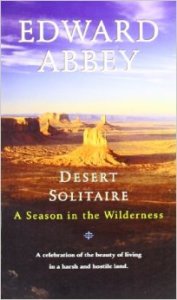
The perfect book for anyone feeling, of late, as though the barbarian hordes are besieging all that is sacred and precious.
Abbey, Edward. Desert Solitaire. New York: Ballantine, 1968. Print.
Genre: nonfiction (nature/politics…enviropolitico?)
Summary: Edward Abbey, a rebel-rousing UNM graduate, goes to work for the National Parks Service. He endures a year in Arches, Utah, where he struggles with the merciless scrape of desert heat, as well as his swelling misanthropy for tourists and park administrators who seem to nimbly defile the sensuous landscape at every turn.
Critique: Like Abbey himself, the writing and narrative within this text are wayward, willful, fluid, stubborn, and unconventional. First and foremost, the book is an ode to the outdoors. A long, luxurious love poem honoring geology, praising desolation, and admiring stark vistas.
Second, the book may also serve as one of the most engrossing horticultural guides you’ll ever read.
Finally, Solitaire may be one of the timeliest treatises you could read this year, as the NPS picks up up the diapers and debris following the massive, record-busting influx of visitors during its 2016 centennial celebration, despite the endemic budgetary strangleholds imposed by Congress which have produced massive infrastructural failures. But will there be National Parks to flock to in the coming years? There is plenty of reason to worry and doubt, given the most recent White House Administration appointments, which have included powerful figures who oppose the fundamental premise of “public lands in public hands,” who ignore the studies linking spiritual and psychological healing with regular exposure to wild lands, who instead subscribe piously to a religion of nature as a source of untapped economic pulp.
Have we been through territory like this before? Yes, says Abbey. And we survived with our Parks–a unique notion in the world when they were first protected for the enjoyment of all people now and in the future, regardless of income, gender, religion, political leaning. Will we, and our Parks, survive this unfolding predicament? On that, Abbey cannot rightly say (and not just because he died in 1989). Since Abbey’s time, the Parks have come to face a truly dire duo of fresh challenges: appealing to minorities and Generation App.
What Edward Abbey might say is that the disconnects these populations experience when they visit a National Park links to the very infrastructure designed to attract them–an infrastructure he vehemently opposed and actively obstructed. Roads. Scenic pull-overs. Clean, running water. Flushing toilets. In Abbey’s view, these conveniences prevent people from breaking past the surface of what it is to be in the wild and witness its jaw-dropping miracles and horrors. Our predilection with comfort inhibits our chance to be and feel exposed…at risk…immersed…swallowed…challenged…basically, alive.
Read this book and take from Abbey a view of what the Parks are and were; what they’ve lost and what they could be. Glean from his feral trompings through the needling canyons what it is to be an animal outdoors, your civilized skin eroding like the stone arches, your spirit expanding, fed fat on the eternal nutrients of sun and space. Read this book and take heart; the revolution will, at least, have campfires!
(Photo credit for the teetering rock: NPS/Neal Herbert.)
Comments